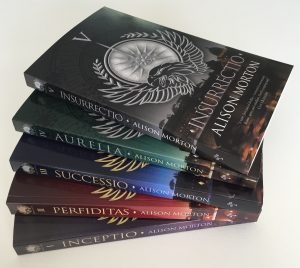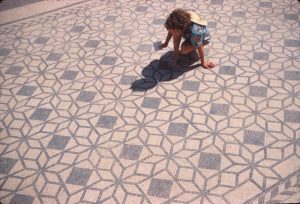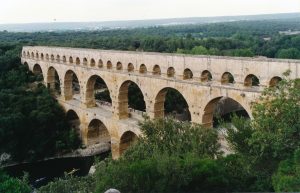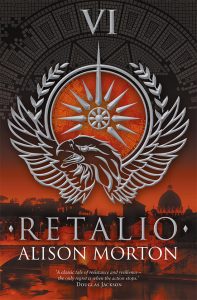My guest today is fellow Romaphile, Alison Morton. A ‘Roman nut’ since age 11, Alison continues to be fascinated by that complex, power and value driven civilisation. Armed with a masters’ in history, six years’ military service and the love of a good thriller, she explores via her award winning Roma Nova adventure thrillers the ‘what if’ idea of a modern Roman society run by strong women. Her sixth book, Retalio, will be published on 27 April. In the meantime, Alison lives in France with her husband, tends her Roman herb garden and drinks wine. You can connect with Alison via her Roma Nova site, Facebook, Twitter, Goodreads and on Amazon.

What or who inspired you to first write? Which authors have influenced you?
Three influences: a bad film, a Roman mosaic and Robert Harris’s Fatherland. Chronologically, the mosaic came first. I was eleven and sightseeing with my family in Spain in the ruins of Ampurias, an important Roman port city. I couldn’t stop running my fingers over the tesserae of the floor mosaics. I was totally fascinated. My numismatist father told me about traders and soldiers, sailors and senators, rich and poor, slave and free. “What did the mummies and children do?” I asked. On being told they mainly stayed at home, I asked, “What would it be like if Roman women were in charge, instead of the men?” Maybe it was the fierce sun boiling my brain, maybe early feminism peeping out or maybe just a precocious kid asking a smartarse question. But clever man and ‘senior Roman nut’, my father replied, “What do you think it would be like?” That stayed with me for several decades…
Fast forward to the early 1990s. Robert Harris’s alternative history adventure Fatherland, published only three years after the fall of the Berlin Wall, was a sensation. I realised you could twist history. I sought out more; Keith Roberts’ Pavane, Kingley Amis’s The Alteration, any science fiction or historical fiction that dealt with ‘what if,’ or events pivoting on the choice of paths, often by chance. I also kept reading a lot of Roman fiction which had started with Rosemary Sutcliff’s The Eagle of the Ninth. While we’re on books I have to mention William Boyd’s wonderful thrillers, especially Restless which features strong women trying to resolve a mystery over generations, and Lindsey Davis’s humorous yet poignant Roman detective Falco series.
And the bad film? I don’t want to be sued, but it had demons and angels. Even though the photography was excellent, the dialogue was chopped up and the continuity absent. I was fired to do better. I sat down at my computer and in 90 days, I had turned out /churned out 90,000 words. It was rubbish as all first drafts are. Then I had to work out what to do next, but that’s another story!
What is the inspiration for your current book, Retalio? Is there a particular theme you wished to explore?
 In the backstory of Roma Nova, the imaginary country where I set my first three thrillers (Inceptio, Perfiditas and Successio, an immoral tyrant, Caius Tellus, had made a power grab years before. A senior imperial councillor and former Praetorian, Aurelia Mitela, had tried to stop him. I only mentioned Caius in the first three books to give a rounded personal history to my main characters. But as I completed the third book of the series, Successio, where Aurelia was in her eighties, I was so fascinated by hints of secrets about her past that I just had to go back and write her story. So I wrote a second trilogy – Aurelia, Insurrectio and Retalio starting in the 1960s and ending in the early 1980s. And it’s Retalio that’s out on 27 April.
In the backstory of Roma Nova, the imaginary country where I set my first three thrillers (Inceptio, Perfiditas and Successio, an immoral tyrant, Caius Tellus, had made a power grab years before. A senior imperial councillor and former Praetorian, Aurelia Mitela, had tried to stop him. I only mentioned Caius in the first three books to give a rounded personal history to my main characters. But as I completed the third book of the series, Successio, where Aurelia was in her eighties, I was so fascinated by hints of secrets about her past that I just had to go back and write her story. So I wrote a second trilogy – Aurelia, Insurrectio and Retalio starting in the 1960s and ending in the early 1980s. And it’s Retalio that’s out on 27 April.
Although a fairly fast moving thriller, it explores recovery from shock at complete loss, through anger, resistance and the thirst for restitution. The forces of irrationality have gained ground over fair-minded and well-meaning people; the rule of equitable law is abandoned; women lose public identity and voice; people are deliberately alienated from each other; betrayal is everywhere. But there are also moral and physical courage, loyalty, honour, resourcefulness, comradeship, determination, humour and, of course, love.
What period of history particularly inspires or interests you? Why?
Rome! It’s almost visceral. It’s gripped me since I walked on that first mosaic. ‘Rome’ lasted 1229 years in the West, which time span would take us back to AD 788 from today. It changed from a tiny community of tribal farmers and, frankly, riff-raff, to a confident military and trading empire boasting high culture, diversity, power, engineering and rule of law, eventually dwindling to a miserable rump kneeling before barbarians. 
Rome had the dark side of all ancient cultures: slavery, rampant corruption, patriarchalism and scant regard for disabled and poor people. But it gave us systems, values, including civic-mindedness, cultural and engineering genius and literacy that are still firmly embedded in our psyches today. In my alternate projection of a Roman society in the present day, this heritage is an integral part of the thriller stories and the characters’ motivations. In their minds, hearts and souls, they are Roman.
What resources do you use to research your book? How long did it take to finish the novel?
 Years of a geeky life of reading and studying have given me a reasonably good general knowledge of European history and some understanding of the historical process. And I’ve clambered over, explored and photographed much of what remains of Roman Europe. Nothing like running your fingers down some Roman concrete, or walking on a Roman road or through the watercourse of an aqueduct!
Years of a geeky life of reading and studying have given me a reasonably good general knowledge of European history and some understanding of the historical process. And I’ve clambered over, explored and photographed much of what remains of Roman Europe. Nothing like running your fingers down some Roman concrete, or walking on a Roman road or through the watercourse of an aqueduct!
But for both Insurrectio and Retalio I used the three years’ research for my history masters’ dissertation where I studied the changes of women’s status during the Third Reich in Nazi Germany. Hitler came to power legally, but had a ‘will to power’ plus a firm populist base of hard line nationalists behind him. So it was a power grab in reality. Caius Tellus, the antagonist of both books, is intent on seizing power more directly, but the process is similar. And both were/are intent on complete control of their countries and on reducing women’s status to dependent/servant without public identity or voice. For the military part of Retalio, I drew on my six years in uniform in the UK Land Forces.
This novel took about ten months as I was busy doing promotion for Insurrectio as well as twelve major speaking events in 2016 which involved a lot of travel, mostly to the UK.
What do you do if stuck for a word or a phrase?
I type something, anything, then push on with the story. When reading through the scene afterwards, sometimes the exact right word pops into my mind. Other times, it’s a slog through the dictionaries. If it still doesn’t come, return to it when I do my first self-edit. After that, it’s my critique partner then my professional editor who will highlight anything that jars or is weak. It just shows that writing involves both hard slog and team work!
Is there anything unusual or even quirky that you would like to share about your writing?
My whole writing world is quirky – an alternative historical timeline, women running a 20th century Roman based state with a feminist twist. But the characters are still very much people we would recognise. Although they live naturally in their Roman style society with strong values, they have the same feelings and aspirations that we do. But inheritance and family names descend through the female line, something that seems quirky and I hope provokes a different way of looking at things…
Do you use a program like Scrivener to create your novel? Do you ever write in long hand?
I stick to clunky old Word for writing and only write in longhand if I don’t have access to a computer such as at a bookselling event. If it’s quiet, I write in my little ‘scribbling book’.
Is there a particular photo or piece of art that strikes a chord with you? Why?
 I’ve stayed faithful to the Pont du Gard, near Nimes since I was seven years old. It’s elegant yet massive, a practical manifestation of Roman authority, but also an inspiration of engineering bringing the essential of life – water – to people in their urban environment. Designed by engineers, paid for publicly, built by both skilled craftsmen and the labouring poor, it’s a true symbol of the complexity and contradictions of Rome. It also makes a nice photograph nearly two thousand years later.
I’ve stayed faithful to the Pont du Gard, near Nimes since I was seven years old. It’s elegant yet massive, a practical manifestation of Roman authority, but also an inspiration of engineering bringing the essential of life – water – to people in their urban environment. Designed by engineers, paid for publicly, built by both skilled craftsmen and the labouring poor, it’s a true symbol of the complexity and contradictions of Rome. It also makes a nice photograph nearly two thousand years later.
What advice would you give an aspiring author?
Don’t! No, seriously, keep at it, keep learning, keep believing you can do better because you probably can.

Tell us a little more about your Roma Nova series.
The Roma Nova series has two trilogies: the first is set in the ‘present’ and features Carina who was brought up in the Eastern United States with just a vague notion of Roma Nova – her dead mother’s homeland. But she’s forced to flee there when a government enforcer is determined to eliminate her. Inceptio introduces her and the reader to Roma Nova and its unique society. Perfiditas (betrayal) is an adventure six years later and Successio (the next generation) dips into Carina’s life nine years later in her bitterest fight yet.
The second trilogy which we’ve talked about here goes back to Carina’s grandmother’s younger days, starting when Aurelia was a young Praetorian officer chasing spies and smugglers, yet never dreaming of the turmoil to come in Insurrectio and Retalio.

Early 1980s Vienna. Recovering from a near fatal shooting, Aurelia Mitela, ex-Praetorian and former foreign minister of Roma Nova, chafes at her enforced exile. She barely escaped from her nemesis, the charming and amoral Caius Tellus who grabbed power in Roma Nova, the only part of the Roman Empire to survive into the twentieth century.
Aurelia’s duty and passion fire her determination to take back her homeland and liberate its people. But Caius’s manipulations have isolated her from her fellow exiles, leaving her ostracised, powerless and vulnerable. But without their trust and support Aurelia knows she will never see Roma Nova again.
Thanks so much for joining me on Triclinium. Robert Harris is a favourite of mine too. No need to mention our mutual love for Roma. Best of luck with the launch of Retalio on 27 April!
You can buy all the books in Alison’s Roma Nova series in digital, audio and paperback editions here. And don’t forget to check out her book trailers!



Such a great and interesting interview. Thank you for posting.
Thank you, Irma. I’m delighted you enjoyed reading it.
I’ve read and enjoyed Rosemary Sutcliff so I’ve now put your titles on my TBR list. Excellent informative interview. Thanks.
Rosemary Sutcliff opened a whole new world for me. I’ve gone back and read it several times over the decades since.
With degrees in history, I am always interested in books that might further my knowledge. Thank you .
Snap! I loved doing my masters’ and found the research and assessment techniques very helpful when I came to writing fiction.
Rosemary Sutcliff’s books were my first dip into Roman Literature. I still love to read them. This interview is so interesting as Alison’s news letters always are. I have learned a lot from them. Her books are outstanding! My next move is to have a browse round yours too Elizabeth. Thank you both.
Yes, do read Elisabeth’s books. I’m not just saying that because I’m her guest. Her research is excellent and her writing vivid. Highly recommended!
You have no idea how much I love alternate histories and the ideas behind them. What ifs are the genesis of storytelling. Wish me luck!
‘What if?’ is an eternal question. ;-)
One thing I maintain is that you have to know your history before you can alternate it. (That’s the fussy historian speaking!)
Thanks for sharing this wonderful interview. She is a new author for me.
Hello, Yaritza. I hope you enjoy exploring the world of Roma Nova.
The Pont du Gard photo is gorgeous!
Thank you Cheri. It’s one of those places that keeps pulling me back. I’ve even used it (suitably tinted in Roma Nova purple) as the wallpaper behind my website.
One of those ‘must sees’!
Ancient Rome does fascinate.
I think it will fascinate me until I go out of the door in my box! And we keep finding new things as new archaeological digs open up sites, as new interpretations of documents are made, as geophysics reveal hidden cities.
Everyone, thanks for dropping by to comment. Alison’s books are a wonderful combination of history and imagination.
I’ve loved being your guest, Elisabeth. You have some lovely readers!
And thank you for your kind words about my books.